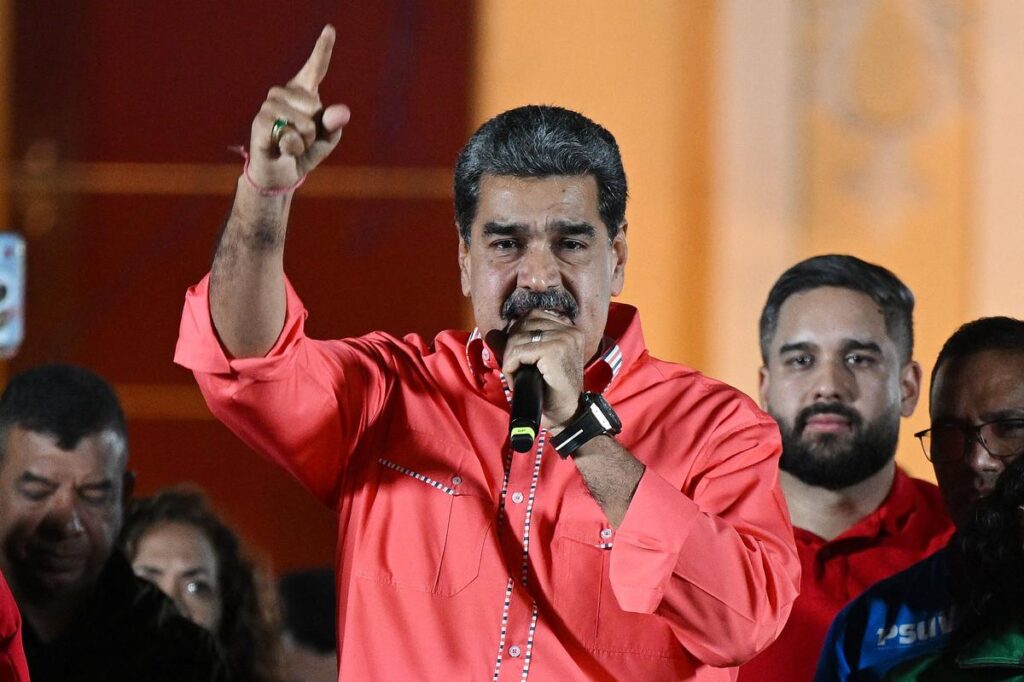By Satyaki Chakraborty
President Nicolas Maduro’s political party United Socialist Party of Venezuela(PSUV) swept the parliamentary and regional elections in Venezuela on Sunday amidst boycott by the major right wing opposition parties as also once ally the Communist Party of Venezuela (PCV),All these parties were opposed to President Maduro’s reelection as the President in the presidential elections held last year.
Venezuela’s electoral council (CNE) announced late on Sunday that the United Socialist Party of Venezuela (PSUV) won 23 out of 24 state governor positions and gained 82.68 per cent of the votes cast for National Assembly members. The president of the CNE announced after the counting was over that the PSUV had won 4,553,484 votes of a total of 5,507,324 votes cast and won 40 of the assembly’s 50 seats. The voter turnout was however low at 42.63 per cent.
President Maduro hailed the election results as a “victory of peace and stability” and said that it “proved the power of Chavismo,” the left-wing movement founded by his predecessor Hugo Chavez. President Maduro succeeded the legendary Hugo Chavez after he died from cancer while in his office as President. Chavez was recognized as a great leader of Latin America during his days.
The opposition has long questioned the independence of the CNE, which is led by Elvis Amoroso, a former legal counsel to President Maduro. President Maduro lost the trust of many left wingers including the Communist Party who were the part of the socialist coalition during Hugo Chavez’s time and also in the initial days of President Maduro’s administration. The left groups distanced themselves after they accused the President of running the country in an authoritarian manner.
The CNE came in for widespread international criticism last year when it declared Mr Maduro the winner of the presidential election without providing the detailed voting tallies to back up their claim. The right opposition claimed that their candidate Edmundo Gonzalez was the real winner. Some European countries as also the USA recognized Gonzalez as the President but Gonzalez could not carry on anti- Maduro agitation for long and his movement fizzled out.
However, on May 25 elections, some small parties took part in polling and that gave some legitimacy to the elections strengthening the hands of President Maduro. Among them were former presidential candidate Henrique Capriles, Zulia state governor Manuel Rosales and Juan Requesens, who was jailed by the Maduro government for allegedly taking part in a 2018 drone attack on the president.
Capriles told Spanish daily El País that for him “voting in Venezuela is an expression of resistance, of resilience, of not giving up”. Their decision to stand in the elections was criticised by those calling for a boycott, with Machado saying they had “betrayed the cause”
According to the preliminary results of the legislative election, the coalition backing President Maduro won an absolute majority of the 285 seats. But three politicians from Henrique Capriles’ opposition UNT party were also voted into the National Assembly, including Capriles himself.
Maduro has hailed the result as a “victory of peace and stability” and celebrated the fact that his party had regained control of the states of Zulia and, in particular, Barinas, the home state of his predecessor in office and political mentor, Hugo Chávez. Only the state of Cojedes will now be in opposition hands, following the re-election of opposition candidate Alberto Galíndez.
Sunday’s vote was preceded by a wave of arrests, which saw more than 70 people with links to the opposition detained for allegedly “planning to sabotage the election”. Among those detained is Juan Pablo Guanipa, 60, a close ally of María Corina Machado. The interior minister accused him of being “one of the leaders of this terrorist network” which he claimed had been plotting to disrupt the election by planting bombs at key sites. Machado said his arrest and those of dozens of others was “state terrorism, pure and simple”.
Venezuelan voters were also asked to choose representatives for the Essequibo region, a territory long administered and controlled by neighbouring Guyana which Venezuela claims as its own. The territorial dispute has been submitted by Guyana to the International Court of Justice, which had ordered Venezuela to refrain from conducting elections for representatives for the region, an order which the Maduro government defied.
As Venezuela is not in control of the Essequibo, there were no polling stations in the territory nor did the people living there got a chance to vote. Instead, voters in a small district expressly created for the purpose on the Venezuelan side of the border were asked to cast their vote, which had only symbolic value.
Neil Villamizar, an admiral loyal to President Maduro, won the unusual vote and will now be declared “governor of Essequibo” by the Venezuelan government even though he has no power or control over the territory, which remains in Guyanese hands. (IPA Service)

 MNREGA: 100 Day-Job Only For 7 Per Cent Households In Rural Areas
MNREGA: 100 Day-Job Only For 7 Per Cent Households In Rural Areas 